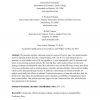Free Online Productivity Tools
i2Speak
i2Symbol
i2OCR
iTex2Img
iWeb2Print
iWeb2Shot
i2Type
iPdf2Split
iPdf2Merge
i2Bopomofo
i2Arabic
i2Style
i2Image
i2PDF
iLatex2Rtf
Sci2ools
113
click to vote
SCW
2016
IEEE
2016
IEEE
Statistical evaluation of voting rules
: We generate synthetic elections using two sources of survey data, two spatial models, and two standard models from the voting literature, IAC and IC. For each election that we generate, we test whether each of 54 voting rules is (1) non-manipulable, and (2) efficient in the sense of maximizing summed utilities. We find that Hare and Condorcet-Hare are the most strategy-resistant non-dictatorial rules. Most rules have very similar efficiency scores, apart from a few poor performers such as random dictator, plurality and anti-plurality. Our results are highly robust across data-generating processes. In addition to presenting our numerical results, we explore analytically the effects of adding a Condorcet provision to a base rule and show that, for all but a few base rules, this modification cannot introduce a possibility of manipulation where none existed before. Our analysis provides support for the Condorcet-Hare rule, which has not been prominent in the literature. Journal of Econom...
Related Content
| Added | 09 Apr 2016 |
| Updated | 09 Apr 2016 |
| Type | Journal |
| Year | 2016 |
| Where | SCW |
| Authors | James Green-Armytage, T. Nicolaus Tideman, Rafael Cosman |
Comments (0)

